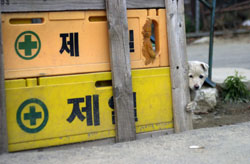![]() Latest News
Latest News
A Closer Look at Korea's New Animal Protection Law
New legislation aimed to fight cruelty and reduce strays
 For the first time since its inception in 1991, Korea’s Animal Protection Law has been drastically revised and updated to afford better protection to animals and harsher penalties to those who abuse them. The revisions in the new law go a long ways towards addressing some of the previous inadequacies of the former law as well as adding legislation to address the increasing number of stray and abandoned animals in Korea. Because of some of the radical changes the law will bring about, the Korean government is allowing a one-year grace period before enforcing the law, which is scheduled to go into effect in 2008.
For the first time since its inception in 1991, Korea’s Animal Protection Law has been drastically revised and updated to afford better protection to animals and harsher penalties to those who abuse them. The revisions in the new law go a long ways towards addressing some of the previous inadequacies of the former law as well as adding legislation to address the increasing number of stray and abandoned animals in Korea. Because of some of the radical changes the law will bring about, the Korean government is allowing a one-year grace period before enforcing the law, which is scheduled to go into effect in 2008.
A full English translation of the new law is now available on our website, and IAKA has now been able to analyze and interpret the revisions and new additions. Though the law still has some shortcomings, it is a vast improvement over its predecessor and we will remain committed to continuing to press for stronger legislation and better animal protection.
Redefining the Language
One of the largest problems with the previous law was that its definitions of animal cruelty were abstract and subject to interpretation, making the law difficult to enforce. For example, it stated that acts such as slaughter, infliction of pain, and intentional abandonment were illegal “without proper, rational reason,” allowing for a legal loophole in defining what was in fact “proper” and “rational.” The new law is very specific in stipulating acts defined as cruelty, such as killing or harming an animal for any reason other than those set forth by the Ministry of Agriculture, or extracting bodily fluids from a living animal.
Encouraging More Responsible Pet Ownership
Though pet ownership has been on the rise in Korea, the lack of information and legislation encouraging responsible pet ownership has resulted in a stifling increase in stray and abandoned animals. Korean shelters are overcrowded and unable to take in all the animals requiring care. Many strays make their way into the meat markets.
Under the new legislation, dog owners will have to register their dogs with the government, attach ID tags and use a leash when in public. Conversely, stray holds for animals detained in shelters have been cut down from one month to a more reasonable 10 days, shortening the time before an animal can be re-homed and easing the strain on shelters. Though the concept of a minimum stray hold is a controversial topic in every country, it can be agreed that a period of 30 days creates an enormous overcrowding problem in shelters and leaves many more animals dying in the streets. Finally, to address public safety, provisions have been included whereby local governments have the power to enact immunization requirements as a condition of registration.
Providing a Better Means for Enforcement
One of the most significant improvements to the new Animal Protection Law is the introduction of an Animal Protection Warden who is required to be appointed by either the Ministry of Agriculture or the governor/mayor of a local government. According to the new law, the Animal Protection Warden must have experience in animal protection, and will have the power to survey abuse and seize animals from their owners. This is especially important, taking the role of animal protection out of the hands of policemen and into the hands of those who have experience and concern for animals.
Imposing Harsher Penalties
In the 1991 version of the animal protection law, only one article made any mention of a fine or punishment,in the entire law - the Prohibition of Mistreatment of Animals. Shockingly, this meant that any other provisions within the law, such as those overseeing the humane slaughter of animals or animal experimentation, were rendered meaningless without any associated fines or punishments.
In the new law, fines are not only significantly increased from a maximum of 200,000 won (approximately $215) but have also been broken down into categories based upon the severity of the offense. The most severe penalties are awarded to those kill animals inhumanely or capture and kill a stray animal, with offenders facing fines up to 5 million won ($5,400). Those who wish to engage in raising selling or importing animals must register with the Ministry of Agriculture and comply to standards of humane care or face fines up to 1 million won ($1,080).
Another groups of violations carries a maximum fine of 500,000 won ($540), including abandoning an animal, refusing entry or otherwise impeding the work of animal protection warden. Lesser fines of up to 300,000 won ($325) are imposed for those who fail to attach an ID tag or clean up after their animals in public.
Room For Improvement
Though the new law comes a long way towards improving the lives of animals, it backs away from directly addressing the chief source of animal cruelty: the dog meat markets. While the law holds specific provisions targeting the cruel ways in which dogs are often killed, there is nothing in the law that either specifies that dogs cannot be killed for food, or suggests that it is illegal to eat them.
Meanwhile, other laws relating to dog meat leave a large gray area regarding the legality of sales and consumption. Under the Livestock Product Sanitation and Inspection Act, dogs are not defined as livestock and therefore cannot be slaughtered under the regulations of the Ministry of Agriculture, but according to the Korea Food and Drug Administration, dog meat is then categorized as a “natural product.” The Food Sanitation Law of 1984 once specified that it is illegal to sell a food product that has been deemed “disgusting” by the Ministry of Health and Welfare, and listed dog soup and dog stew amongst the examples. However, this law was later revised in secret to omit dogs from the list of disgusting foods.




